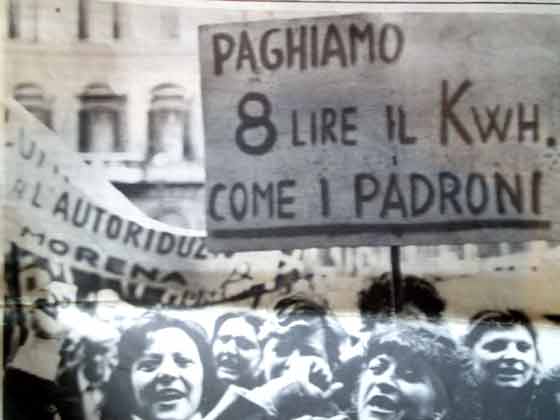[Self-reduction slogan: "We'll pay 8 lire per kilowatt, just like the bosses"]
The following text was from the first issue of Lavoro Zero - Giornale dal Veneto [Zero Work - Journal of the Veneto],
an Italian communist journal from the '70s. As noted, it's from the Veneto region, that same tough-as-hell area from which came two of the earlier texts translated (here and here).Crisis and domestic work
“How the economic crisis determined a rise in the burden of domestic work for women”
The first major division within the world of labor is that of waged and unwaged labor.
In the statistics and the inquiries that look at the labor market, a major mystification is at work: that only those who receive a wage are considered “workers.” Instead of all the strata of the population that don’t fall in the category of the waged: the young, the old, but above all, in the vast majority, the women who make up the “inactive” and “dependent” population.
There are 21,754,000 persons in Italy who “don’t work,” of which 5,586,000 are men and 16,168,000 are women (data from ISTAT 1968). However, this huge slice of population is directly functional in the capitalist organization of labor (even if non directly salaried by Capital): it is responsible for the value-adding production-reproduction of labor-power itself, and it therefore determines and defines, time after time, the conditions of production and profit. In fact, the worker can sell himself on the labor market for a low wage only if the necessary services for his reproduction come for free from the family. In practice, every waged worker has behind him an unpaid worker (mother, wife, sister…) who makes sure that her can present himself at work every morning in a decent condition. This discourse is valid also for the women who work out of the house, though to a far lesser degree. In fact, while for the male worker, his reproduction and reintegration is always assured [note: “prevista” - literally “pre-seen”, could also be thought of as “seen to”], the woman is the only worker for whom these moments [of reproduction and reintegration] are not assured: she must, in practice, self-reproduce as labor-power throughout her entire life, whether within the house or outside it.
Women never stop working. In the office or on the assembly line, every woman drags with her the thought of housework: the laundry, the floors, the cooking, whatever’s missing at home that she must remember to buy, the kids… because of this work, the rate of women’s absenteeism [i.e. at work outside the house] is much higher than that of men’s, because of this the woman can be more easily blackmailed [note: the sense here is that because a woman always has to be working too jobs, and hence has to skip work “outside” the house much more often, it’s easier to threaten her] at work than a man, and this blackmailability brings with it a salary lower than that of men for similar work (even if the laws are supposed to guarantee wage parity), because of this this women are almost always absent from union assemblies and almost never hear their own voice, their point of view. After work, as soon as the bell sounds, the woman is the first to run home, where the housework is waiting.
The crisis of these years is carrying to extreme consequences a process already at work since the end of the second world war: the mass expulsion of women from the labor market. These women don’t register in the official unemployment statistics: their unemployment wasn’t conflictual because they returned to the home, definitely without even being inscribed on the list of the unemployed. The official government interpretation saw in this expulsion of women from the labor market an increased well-being of the family that allowed women to stay at home. This increased well-being, however, entirely ignores the diminution of real wages due to the continual increase in the cost of living. In fact, the mass of laid-off women (more than a million between ‘63 and ‘68), just like the increase of schooling and the lowering of the retirement age, certainly can’t be explained by the rise of well-being, but fits within a quite precise plan of the capitalist State to exit the crisis: consolidate the family and link all the components to a sole salary, that of the head of the family, thereby controlling simultaneously the struggles of the worker and of those who are his economic dependents.
The crisis, then, has worsened our conditions of life because it has relegated us more and more to the restricted space of the house, and within these few square meters, it makes us work so much, constraining us to regulate our lives to the increasingly uncoordinated rhythms, in double and triple shifts, of the work and study of other components of the family. Through this mode, a reality of domestic work increasingly configured, one in which not only do you burden yourself and accumulate tasks such as the washing, the sewing, the cleaning, the cooking, the shopping, etc… but one in which your psychological availability to others must become near total. Domestic work today means to literally give over your own life to that of others (kids and husband), to their spaces, to their times, to their rhythms.
The traditional figure of the housewife has almost completely vanished. Today, the woman must stay at home because she is used more and more at home, but she must be highly qualified to match a job description that grows bigger and more challenging, one loaded onto her shoulders: she has to adopt a new way of educating kids, knowing a minimum of pedadogy and puericulture,
But if this is the plan of capital over our heads, we women haven’t accepted it, and we’ve given hard responses with our struggles and our demands. The 3,000,000 abortions a year express the precise will of women, even with all the costs and risks that clandestine abortion carries today, to assert the right to decide when and if we become mothers. The large part of abortions can be read also as the refusal of women to pay for maternity in terms of the increase of domestic work and the further control over their lives.
But abortion remains a mass behavior because it isn’t organized in any way, other than at minimum levels. So too stays at the individual level all the “thefts,” loads of them, in the big stores, attributable, for the large part, to women and youth (so much so that in Mestre, for example, the owners had to adapt new forms of antitheft controls and to keep devising new ones). There were, above all, the latest forms of struggle by women to express in an organized way the need for a better life, and therefore, for money. In recent years, women occupied houses because they refused to perform domestic work in the tenements and in housing in which it was impossible to live decently, they occupied schools, kindergartens, commons, and factories, they developed themselves the practice of the self-reduction of rent and bills, they protested and demonstrated in front of supermarkets against the raising of prices. As these struggles, above all the self-reductions here in the Veneto, were carried out, they demonstrated the serious capacity of women for organization. And precisely to the extent that they were women, they automatically carried a crisis to the interior of the family and domestic life: on the one hand because some men weren’t at all in agreement with the self-reduction, and therefore many women collected the bills secretly, and on the other because even those men who were initially in agreement hadn’t wanted to adapt to taking care of the kids in the evening and to eating eggs from the pan, so they impeded the struggle every way they could.
The struggles of women are always contradictory in certain ways and always conserve a deep ambiguity, because they are almost never against their own specific exploitation, or towards a project of autonomy. And so even self-reduction, rather than having the primary significance of a break, hasn’t been able to built a base form of lasting organization of women against domestic work that is at the material roots of their exploitation. These struggles remained within the logic of the defense of the worker’s wage, a defense that the worker could no longer conduct by himself inside the factory, but which had to extend also to the territory beyond. They [these women’s struggles] therefore remained contained within an indirect demand for money by women, but mediated through the worker’s wage. However, in these moments, women expressed a first refusal of their role, because instead of choosing the role of the perfect and ever-ready housewife imposed capital, they chose struggles. The crisis didn’t succeed in chasing them back into the home.
The problem at this point is to see how, departing from this level of politicization, we can find the next practical outlet, one that will see us women organize to demand money directly for us.


